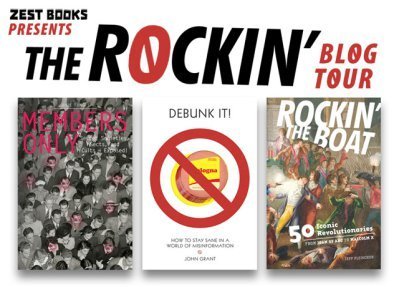7 Questions I Always Ask +1 with John Grant, author of DEBUNK IT
Today on 7 Questions +1 I have John Grant, author of DEBUNK IT, a book that takes down myths and gives young people the tools to call out crap when they see it. He’s out on the Zest Books Rockin’ the Boat Blog Tour, and I’m glad to have John here to answer a few q’s.
E. Kristin Anderson: What was the first spark of inspiration for your latest book?
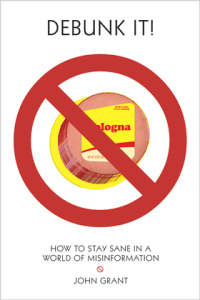
Zest Books, February, 2015.
John Grant: I was giving a talk about science denialism at one of the larger local libraries and there was a kid there in the audience with his parents. His name was Franklin and I’d guess he was about 14 or 15. During the Q&A session afterwards, he stuck up his hand and said, “You know, there ought to be a sort of guide to bullshit for people my age.” Two things surprised me. One was that, when I was his age, if I’d said “bullshit” in public and my parents were there, I’d have been in deep trouble. But the other was that it was a great idea! So that evening was born the notion for a book called THE YOUNG PERSON’S GUIDE TO BULLSHIT, and to my delight Zest bought it. Of course, booksellers balked a bit at the title, so we had to change it…
EKA: What kind of planning do you do before you start writing?
JG: Depends, really. When I’m writing fiction I tend to start off with an idea of the mood I want to evoke, who some of the people are, where the story begins and roughly where it might end, but that’s about as much planning as I can face – hardly deserves the word “planning,” does it!
For nonfiction books I’ve usually worked up a fairly detailed synopsis beforehand for the publisher so that we know exactly what the structure and content of the book are going to be. Then, well, you know how it goes. I change it all as I go along. DEBUNK IT! was one of the unusual ones in that the final text was reasonably close to what the synopsis had indicated.
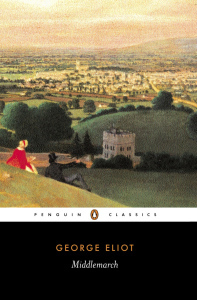
Penguin Classics, Revised Edition, March 25, 2003.
EKA: If you could get moderately tipsy with any writer living or dead, who would it be?
JG: I’ve actually gotten moderately tipsy with quite a lot of writers at conventions and such – and intend to do so again later this year at the World Fantasy Convention. So let’s cut this down to “dead authors I’ve never met.” A few years ago the author Gregory Frost called me “The living heir to Martin Gardner,” and it was one of the biggest thrills of my writing life. So I’d really like to have a drink with Martin Gardner, although that might be quite an intimidating encounter for me. Gardner had twice the brains I have. Maybe more than twice…
Going back a bit further in history, the author I’ve always dreamed of meeting is George Eliot. She had a really quite fascinating mind, and there’s so much compassion and wisdom in her novels.
EKA: What is the first book you remember reading and enjoying as a young reader?
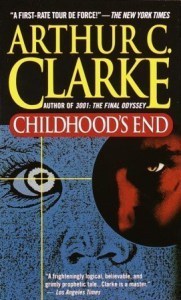
Del Ray, Reprint Edition, May 1987.
JG: Oh, lawks, that’s a difficult one. The first one I can remember really having an impact on me? CHILDHOOD’S END by Arthur C. Clarke. My very much older brother shoved his copy into my hands at some point to get me to shut up, and to his amazement I devoured it and demanded more. After that I went through all the science fiction and fantasy in the kids’ section of the local library and then, thanks to a friendly librarian, the adult section too. Pocket money went on it too – there was me buying C.S. Lewis at the age of nine or so, oh my. Later, maybe in my mid-teens, I discovered crime fiction, and those two genres have dominated my leisure reading ever since.
The first nonfiction book that really had an impact on me was FRONTIERS OF ASTRONOMY, by Fred Hoyle. Again I blame my big brother! What Hoyle’s book really gave me was my sense of wonder – the realization that the universe was a far bigger and stranger and more beautifully mysterious place than I’d ever imagined, and that I could be lucky enough to begin to understand it.
EKA: If you could go back and time and tell your teen self ONE THING AND ONE THING ONLY, what would it be?
JG: Well, there’d be a couple of future girlfriends I’d be telling myself to avoid… More generally, I think I’d tell myself that life’s shorter than you think it is. You don’t get a big enough ration of years to waste a load of them believing in nonsense. Before you believe anything is true, take a moment to think about who’s telling it to you. That sort of thing.
EKA: Have you ever had a book challenged or banned?
JG: No, although I get the occasional unpleasant piece of email from creationists, climate deniers and the like, upset with me that I believe in and promote the scientific reality rather than their pet theories. I stick it into a folder on my computer called FAN MAIL.
I suppose, though, that I ought to write something properly bannable – I mean, many of the writers I most admire have done so. Hm. Thanks for the idea, Kristin…
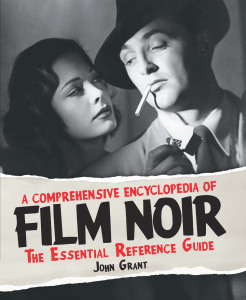
Limelight Editions, October 2013.
EKA: What kind of book do you really want to try to write, but haven’t ever attempted? And what do you think is holding you back?
JG: I’d really like to write a hardboiled noir novel. As I said, I’m interested in crime fiction, and I’ve written some short stories and a brace of novellas in that genre – or more usually a sort of crime/fantasy cross. And I’m also very much into film noir – my vast COMPREHENSIVE ENCYCLOPEDIA OF FILM NOIR came out a couple of years ago, and I run a site called Noirish covering movies, often very obscure ones, that are on the fringes of noir. So for me to write a hardboiled crime novel would seem a natural development. What’s holding me back is twofold – first that I haven’t come up with the right idea, and second that I can’t imagine a publisher being that interested!
EKA: What was the most surprising thing you discovered while researching DEBUNK IT?
JG: Well, it wasn’t so much a piece of research as something that happened while the book was in its early stages. It was that astonishing moment when Bill O’Reilly announced in all seriousness on TV that no one understood how the tides worked — that they were a sort of everyday miracle. I couldn’t believe that anyone could have got to his position of prominence and yet remained so astoundingly ignorant. It’s been known for hundreds of years that tides are a gravitational effect — in our case, the product of the moon’s pull on the earth. While I wouldn’t necessarily expect a TV pundit to be able to explain the details to me, I’d certainly expect him to know as much as I’ve just outlined. And yet O’Reilly clearly thought it was this immense puzzle that science had tried to tackle but failed.
It sounds as if I’m picking on him, but the real eye-opener was, as I say, that this level of ignorance about basic, school-level science was so prevalent. He presumably had come out with this tosh to friends and acquaintances, and clearly none of them had known any better either to put him right. Amazing. And these are people who’re regarded as opinion-formers on subjects like climate science that really are difficult.
It was at that point that I realized quite how right Franklin had been!
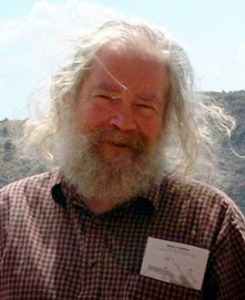
John Grant.
John Grant is author of about seventy books, including the highly successful DISCARDED SCIENCE, CORRUPTED SCIENCE, and DENYING SCIENCE. For a number of years he ran the world-famous fantasy artbook publisher Paper Tiger. He has won the Hugo Award (twice), the World Fantasy Award, and various other international literary awards.






